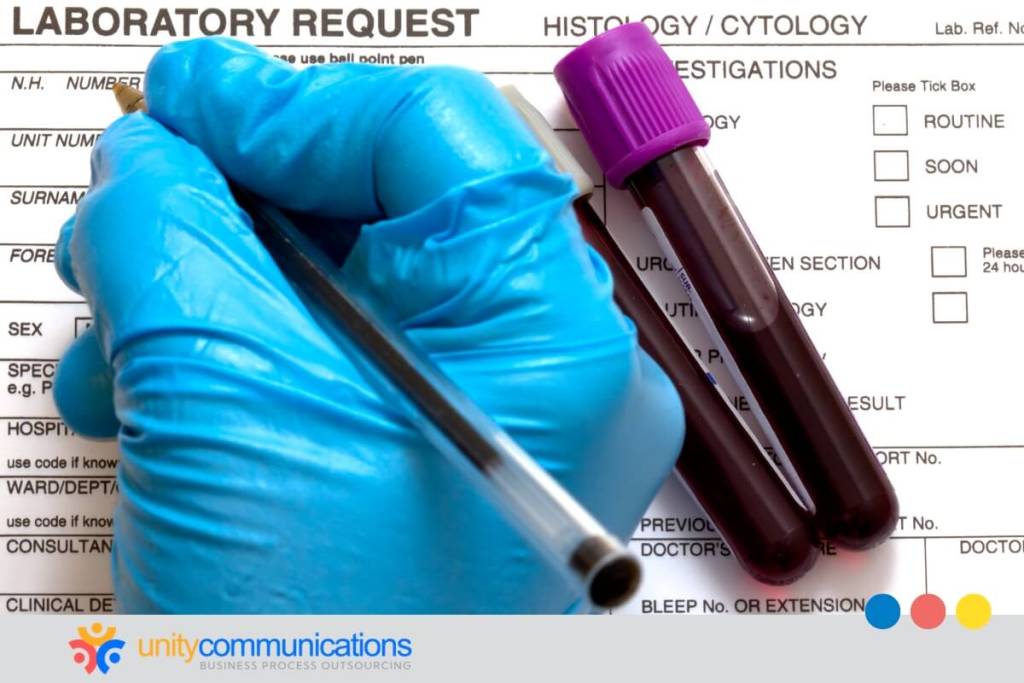IN THIS ARTICLE
Table of Contents
Virtual assistants are transforming laboratory operations, significantly enhancing efficiency and service quality. With virtual assistants streamlining laboratory requests, facilities can expedite processing times and maintain data accuracy.
A virtual medical assistant (VMA) handles administrative functions such as data entry and request coordination, allowing lab technicians to focus more on analysis and similar critical activities. Their integration into laboratory workflows boosts productivity and accuracy.
Keep reading to learn more about how VMAs can improve lab efficiency by handling procedure requests.
Role of virtual assistants in laboratory operations

Virtual assistants have become increasingly vital in the healthcare industry for enhancing operational efficiency and are typically sourced through business process outsourcing (BPO), which offers the same advantage. But what is BPO?
BPO is the practice of delegating specific functions to third-party service providers. Organizations across industries adopt this strategy to cut operating costs. However, leveraging BPO in telemedicine and healthcare provides a unique opportunity: access to virtual medical assistants from around the world.
Virtual assistants effectively handle any healthcare process in BPO, be it data management or patient support. In medical labs, VMA support is effective for streamlining laboratory request management.
Automating routine tasks
Virtual assistants are streamlining laboratory request management by automating routine administrative tasks. Their automation capabilities include:
- Data entry: VMAs handle inputting and updating patient and test information into laboratory systems, minimizing errors, and keeping accurate records.
- Lab test scheduling: They automate lab test scheduling, coordinate appointment times, and optimize resource allocations.
- Result notifications: VMAs automate the delivery of test results to patients and healthcare providers, ensuring timely and secure communication.
Automating these routine tasks frees up valuable time for laboratory staff and allows them to focus on more complex and critical aspects of their work.
Handling patient communications
Lab tests often require specific patient instructions, such as fasting before the test or avoiding certain medications. Effective communication of these instructions contributes to accurate results and prevents potential issues.
Virtual assistants are vital in conveying these instructions clearly and promptly, helping patients adhere to preparations and enhancing the efficiency of lab processes. They manage various interactions, such as:
- Appointment scheduling: VMAs coordinate with patients to set up appointments, manage scheduling conflicts, and send confirmations, reducing administrative burdens on laboratory staff.
- Test reminders: They proactively send reminders to patients about upcoming tests or procedures to help patients adhere to their scheduled appointments and preparations.
- Follow-up communications: VMAs handle follow-up messages to check patient progress, provide test results, and address additional questions, enhancing patient engagement and satisfaction.
With virtual assistants streamlining patient communications for laboratory requests, operations become more efficient, and patients experience the best care.
Benefits of virtual assistants in labs

Integrating virtual assistants into laboratory settings offers patients and healthcare providers many benefits. For example, employing a virtual assistant for Phoenix healthcare can automate data entry and appointment scheduling and simplify pre-test instructions and follow-up communications.
By outsourcing administrative tasks in healthcare to VMAs, laboratories can optimize their workflows and enhance productivity. Exploring how virtual assistants contribute to this transformation reveals the potential improvements in lab efficiency and effectiveness.
Improved turnaround times
By efficiently managing administrative tasks, virtual assistants can significantly improve lab request processing times. VAs handle routine duties quickly and accurately, eliminating delays caused by manual processes.
They can swiftly encode data for lab requests and coordinate appointment schedules while the lab technicians focus on conducting tests and analyzing findings. These can lead to faster turnaround times for test results and improved lab efficiency.
Enhanced accuracy and compliance
With virtual assistants streamlining laboratory requests, facilities can maintain accuracy in patient records and ensure compliance with healthcare regulations. VMAs can:
- Automate data entry. VMAs automate the input of patient information and test results with high precision, reducing manual errors and ensuring that records are accurate and up-to-date.
- Implement automated checks. They use automated systems to verify and cross-check data and identify discrepancies or inconsistencies that might go unnoticed during manual audits.
- Uphold regulatory standards. VMAs stay updated with healthcare regulations and standards, incorporating necessary checks and balances into their workflows to ensure that all processes adhere to legal and procedural requirements.
Virtual assistants can implement robust accuracy and compliance strategies to streamline laboratory request management and maintain operational integrity. With VMA support, medical labs can provide the best service for patients.
Implementing virtual assistant services to laboratory operations

Incorporating virtual assistants into laboratory settings enhances the facility’s operational efficiency. Understanding how outsourcing works provides valuable insights into this integration. Virtual assistants offer services that align with the unique needs of laboratories, creating opportunities for streamlined processes and improved performance.
Explore strategies for effectively leveraging VMA support through healthcare BPO services for more efficient laboratory operations:
Integration with systems
Integrating virtual assistants with laboratory information systems (LIS) is crucial for ensuring seamless data flow and minimizing human error. LIS platforms can automate data entry, streamline communication, and precisely manage test requests.
Laboratories can accurately process and update patient information, test results, and other critical data in real time. Integration helps reduce manual errors, enhances data consistency, and facilitates a more efficient workflow within the lab.
Training and adaptation
Effective training is essential for staff to fully leverage virtual assistants’ potential in laboratory settings. Proper training helps laboratory personnel understand how to interact with VMAs, integrate them into workflows, and utilize their capabilities to enhance operational efficiency.
Overcoming challenges in leveraging virtual assistants
Leveraging virtual assistants for streamlining laboratory request management might present various challenges. Thus, choosing the right virtual assistant is crucial for addressing these issues.
Here are common challenges in VMA and lab collaborations and how to overcome them.
- Privacy concerns: Implement robust data protection measures and ensure virtual assistants comply with healthcare privacy regulations to safeguard patient information.
- Resistance to change: Provide comprehensive training and involve staff in the implementation process to ease the transition for virtual assistants and foster acceptance of new technologies.
- Integration issues: Determine whether virtual assistants can work with LIS and resolve integration problems promptly.
- Quality control: Implement oversight mechanisms to monitor virtual assistants’ performance to know whether they meet accuracy standards and provide consistent results.
Addressing these challenges ensures that virtual assistants can enhance laboratory operations rather than complicate them.
The bottom line
Virtual assistants can improve laboratory operations by automating tasks, increasing accuracy, and ensuring compliance. They can speed up processing, enhance data management, and improve patient communication, efficiency, and care.
Lab managers should consider using virtual assistants for streamlining laboratory requests, optimizing workflows, and boosting performance. Explore how virtual assistants can fit your lab’s needs and start improving efficiency and patient satisfaction today! Let’s connect.





